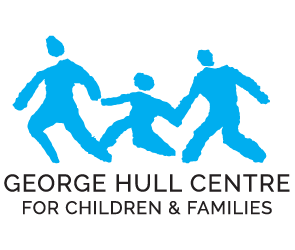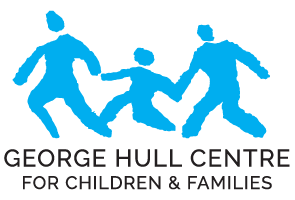Contact Us 416-622-8833
Frequently Asked Questions
The George Hull Centre is for children and youth from 0 to 18 years of age and their families. The Centre provides professional consultation, support and family treatment for a broad range of problems affecting the mental health of children and youth.
A mental health professional will meet with you, your child and other family members to begin to understand your situation and to plan an appropriate course of action with you.
You begin by calling the Intake Office at 622-8833, extension 258. You may want to know about our services or you may want to make an appointment. The Intake Coordinator will talk to you about your concerns and gather some information to help us to begin to understand your situation. She may schedule an initial consultation interview or suggest that you speak directly with a mental health professional
No fees are charged to children and families. Children’s mental health services are funded by the Ontario Ministry of Children and Youth Services. However, on occasion, there will be a fee associated with a group program. These fees are intended to offset the cost of group materials and supplies. No one will be turned away based on an inability to pay.
The Intake Coordinator will ask you questions about the problem or situation for which you are seeking assistance. She will also collect basic demographic, health and other background information required for us to start to plan services with you.
The wait times vary, depending on the service you need. Shorter term therapies (under 8 sessions) are available more readily. More intensive services tend to have a longer wait time.
The intake worker will discuss with you the options and range of services available at the Centre, and also what resources in the community could be of help to you and your child.
The George Hull Centre is staffed by social work, psychiatry, psychology, child and youth work, early childhood education and speech and language pathology. Many of the staff at the Centre have fifteen or more years of experience in the field, and have taught students or other professionals.
Please feel free to ask staff about their professional qualifications and experience.
You will meet with a mental health professional and talk about your concerns and needs. You will be asked to bring along other family members in order to provide as broad a perspective as possible.
Youth may wish to be seen on their own, and this is fine.
If you are unsure about who should attend the initial session, please contact the Intake Coordinator or ask that the mental health professional call you to discuss the matter.
This will depend upon your situation and need. Families usually come weekly or every second week. Some situations can be resolved in a few sessions, while others require meetings over the course of a few months or longer. Sometimes families will meet intensively at a certain stage in their children’s lives and then return from time to time for a few sessions in order to address specific issues.
Please speak openly about your concerns and be sure to ask questions when you are unsure about something.
Try to keep an open mind to new ideas or information that may come up in sessions. Just meeting and talking as a family sometimes throws new light on a situation or serves as a positive experience.
Many answers will come from your own insight with time, effort and patience.
Most problems take a long time to build up. Be patient with yourself and do not expect overnight solutions. It may take awhile for things to be better.
Yes. Your involvement with the Centre is private and confidential. Your information will be shared only among George Hull Centre staff and students who need to know in order to help with your situation. All staff and students are bound by rules of confidentiality.
Private and confidential information is released only with the consent of the parent, young person or their legal representative. Exceptions are made in the case of suspected child abuse, where reporting is mandatory; where the law requires disclosure through a court order; or where the client or another person is at serious risk of harm.
If you have any questions about confidentiality, please raise them with your mental health professional.
The Child and Adolescent Functional Assessment Scale (CAFAS) is a rating scale that is completed by the social worker, psychologist or psychiatrist who works most closely with your child and family. CAFAS is being used in many children’s mental health centres across Ontario. This scale helps staff to understand how your child is functioning at home, in school, in the community, and with friends and peers. It also provides information about your child’s mood and if there are problems with substance use or thinking clearly. CAFAS also provides information about your family’s needs.
The information that is collected during CAFAS assessment is stored securely and treated confidentially. Our foremost reason for gathering information about your child and family is to develop a care plan and deliver the services you need. As well, we sometimes combine and analyze client information to determine if our services are effective overall, or how we can improve them or manage them better. All outcome data is reported in a non-identifying way. This means that no names or information that could identify you or your child are ever reported. For additional details, please click here for the attached CAFAS brochure.
Mental health professionals are able to offer assistance in a variety of languages in addition to English. Translators may also be used.
The George Hull Centre is a teaching centre for graduate students in social work and psychology, psychiatric residents, medical students, child and youth work, speech and language, nursing and early childhood education students. With your consent a student may be assigned to work with you. In all cases the student is supervised by a full-time staff member who is responsible for your care.
Feel free to contact the student’s supervisor if you have any concerns or questions about working with the student or about the planning or direction of your case.
The Centre also conducts research on how best to meet the mental health needs of children and families. Participation in a research project is voluntary, and you will always be given specific information about a study’s goals and procedures, and asked for your consent to participate. You may decline or withdraw from participating at any time without affecting the services you receive at the Centre.
Your information will remain confidential. Study results are reported in the form or group data without any individual identifying information.

